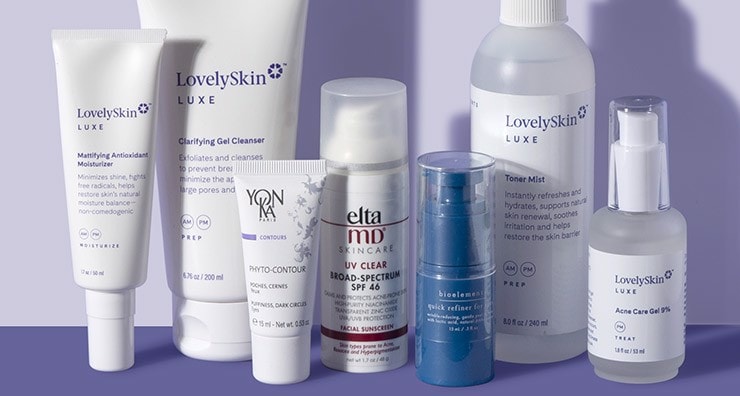
About the Author
Jill is a content writer for LovelySkin. She loves reading up on the latest beauty trends, going to concerts with her husband and baking with her three kids.
Other Posts by JillWelcome to LovelySkin.com.

If you’ve ever noticed small, white, hard bumps on your face and wondered what they were, you’re not alone. In fact, you might be dealing with milia! Milia refers to tiny bumps that are often mistaken for acne when they’re actually just trapped dead skin cells with nowhere to go. We’re breaking down everything you need to know about these little white bumps to answer all your questions about skin care for milia, including regarding how to remove milia from your face and more. With expert advice from board-certified dermatologist and LovelySkin CEO Dr. Joel Schlessinger, keep reading to learn:
Milia are often confused with whiteheads or new pimples. Actually, milia are nothing more than keratin-filled cysts trapped under the skin. People of all ages and skin types can develop these harmless cysts, and they can occur by themselves (known as milium) or in multiples (called milia). Depending on your skin tone, milia can look white, yellow or blue-tinged, and unlike a pimple, a milium feels very hard to the touch.
Primary milia occur when skin isn’t able to exfoliate, or shed dead skin cells, properly. [Milia may disappear on their own](https://my.clevelandclinic.org/health/diseases/17868-milia / _blank ), but it can take weeks or months for them to go away. Nearly half of all infants experience milia after birth, as the new skin’s exfoliation processes aren’t regulating properly yet. However, once they do, milia on skin tends to fade naturally. In adults, milia can pop up anywhere, but they usually show up in the thin, fragile skin under your eyes or on your eyelids. “This skin does not contain the same oil glands as the rest of the face, which hinders optimal exfoliation, leading to milia,” Dr. Schlessinger says. “Applying heavy, thick under-eye creams that don’t absorb properly into your skin can also increase the likelihood of developing milia under the eyes.”
Adults can also develop what’s known as secondary milia, which occurs after damage caused by a rash, burn, infection or excessive sun exposure. This injures the pore lining and traps dead cells in the sweat ducts, creating milia. If you think you are experiencing secondary milia, it’s a good idea to schedule an appointment with your dermatologist, so they can take a look and advise recommended action.
If you rarely experience issues with milia on skin or you aren’t bothered by them, it’s best to just leave them alone. They are almost always benign and don’t require any treatment. However, if you want to safely remove milia for cosmetic reasons, it’s time to visit a board-certified dermatologist. “At your appointment, your physician will use a sterile needle, blade or comedone extractor to extract the keratin cyst,” Dr. Schlessinger says. “Do not attempt this at home. In unskilled hands, performing an extraction can cause unwanted scarring or infection. Like with acne, try to resist the urge to squeeze or pop milia. They are usually resistant to manual squeezing, and all you’ll do is traumatize the surrounding skin.”
While a procedure at the dermatologist’s office is usually the only way to remove milia on your face, it is possible to prevent them. Here are three ways you can help prevent primary milia from forming on your skin in the first place.
1) Regularly exfoliate at home
“A skin care routine with gentle exfoliation is one way to help prevent milia at home,” says Dr. Schlessinger. The LovelySkin LUXE line features a daily cleanser, treatment gel, toner mist and mattifying moisturizer all containing afaLUXE to provide effective exfoliation. “I like this system for acne, anti-aging and milia prevention in particular,” Dr. Schlessinger says “afaLUXE is an amino-based filaggrin antioxidant that effectively exfoliates skin and encourages cell turnover with no downtime and minimal irritation, meaning it’s effective and safe for every skin type.”
Start your routine with LovelySkin LUXE Clarifying Gel Cleanser, which matches afaLUXE with salicylic and glycolic acids to provide gentle, effective exfoliation. Next, apply LovelySkin LUXE Acne Care Gel 9%, which helps heal and treat acne as well as stimulate collagen production to maintain a healthy moisture balance in your skin. The final two steps in this system, LovelySkin LUXE Toner Mist and LovelySkin LUXE Mattifying Antioxidant Moisturizer, both contain afaLUXE as well for added exfoliation to help prevent breakouts and face milia from forming over time.
2) Avoid sunburn and sun damage
Because excessive sun exposure can potentially lead to milia formation, Dr. Schlessinger recommends staying out of the sun during peak hours and wearing a broad-spectrum sunscreen with an SPF of 30 or greater. EltaMD Clear Broad-Spectrum SPF 46 Sunscreen is a LovelySkin favorite that comes in both tinted and untinted formulas. In addition to providing superb sun protection, this sunscreen also provides extra exfoliation benefits with lactic acid while simultaneously calming inflammation with help from niacinamide.
3) Try a targeted eye treatment
Eye treatments formulated to prevent or reduce the appearance of face milia can also help. Bioelements Quick Refiner for Eyes is a gentle exfoliating treatment that is designed to address milia-prone skin and minimize fine lines around the eyes with a blend of lactic acid and papaya enzymes. Another great option is Yon-Ka Phyto-Contour Dark Circle Eye Treatment. This is a multi-benefit eye cream that helps reduce the appearance of milia, puffiness and dark undereye circles using a mixture of skin-loving peptides, vitamin E and other hydrating ingredients, such as glycerin, aloe vera and hyaluronic acid.
Looking to improve your skin’s texture and firmness? Check out the LovelySkin Blog today for derm-approved picks for the best anti-aging body lotions.
How to take a minimalist approach to you...
How to get glowing, radiant skin with mu...
Follow us on social networks and be one of the first to learn about sales, giveaways, and free samples
| Mon - Fri | 9 - 5 p.m. CT |
|---|---|
| Sat (chat only) | 9 - 3 p.m. CT |
| Sun / Holidays | Closed |
| Call or Text: | 402-697-1100 |
|---|